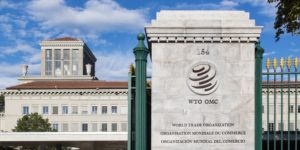The United Nations and the WTO
Introduction to International Federalism
In the twentieth century, the philosophy behind classic international law became increasingly unable to provide an undistorted reflection of the changed social reality of international relations. The shockwaves of the Second World War blew away the blind belief in an international legal order founded on the idea of State sovereignty. The rise of international cooperation caused a fundamental transformation in the substance and structure of international law. The transition from a law of ‘coexistence’ to a law of ‘cooperation’ changed the structure of international law ‘from an essentially negative code of rules of abstention to positive rules of cooperation’. The – solidified – expression of this new philosophy of cooperation was the spread of international organizations. The United Nations (1945) and the Word Trade Organization (originally: GATT, 1948) represent that spirit most clearly. And at the beginning of the twenty-first century, both international organisations have become so important that they influence many “domestic” questions within States.
May we qualify these international developments with the language of federalism?
(1) Federalism in The United Nations
 This project concerns the application of constitutionalist norms and principles to the United Nations. In the early 2000s, Bardo Fassbender argued that the UN Charter exhibited elements of a constitution. The 2000s debate very much concerned questions of hierarchy, with emphasis being placed on ‘trump’ norms, such as Article 103 of the UN Charter and jus cogens norms. International constitutionalism has slowly moved on from the re-reading of the UN Charter as a constitution and now concerns itself with public law style questions on the rule of law, democratic legitimacy and accountability.
This project concerns the application of constitutionalist norms and principles to the United Nations. In the early 2000s, Bardo Fassbender argued that the UN Charter exhibited elements of a constitution. The 2000s debate very much concerned questions of hierarchy, with emphasis being placed on ‘trump’ norms, such as Article 103 of the UN Charter and jus cogens norms. International constitutionalism has slowly moved on from the re-reading of the UN Charter as a constitution and now concerns itself with public law style questions on the rule of law, democratic legitimacy and accountability.
From Fassbender’s interest in the United Nations, the debate on international constitutionalism has spread. There are other sectoral constitutionalisation debates and there are also debates on global constitutionalism. For background reading, see Global Constitutional Law
(researched by Thomas Sparks and Ruth Houghton)
(2) The Word Trade Organization and the Idea of Federalism
This research explores the contribution that the World Trade Organization (WTO) to multi-level governance through the lens of Federalism.
 Building upon the discussion on the different aspects of the constitutionalisation of the WTO, this research project aims at clarifying the relation between the World Trade Organization and the broad framework of public international law and the nation constitutional systems. In doing so, a key aim of this research is to investigate the regulatory evolution of the founding principles of multilateral trading system, framed as tension between progressive negative liberalization and positive integration, at different levels of trade governance.
Building upon the discussion on the different aspects of the constitutionalisation of the WTO, this research project aims at clarifying the relation between the World Trade Organization and the broad framework of public international law and the nation constitutional systems. In doing so, a key aim of this research is to investigate the regulatory evolution of the founding principles of multilateral trading system, framed as tension between progressive negative liberalization and positive integration, at different levels of trade governance.
For background reading on the issue of the Constitutionalisation of the WTO
Moreover, this research focuses on the current fundamental shifts in global trade governance, parallel to the WTO. In the recent years, various Preferential Forms of Trade Integration have been established between a wide range of states, within and outside the WTO framework: regional and mega-regional trade negotiations, as well as plurilateral and “critical mass” agreements, such as the re-negotiation of the Government Procurement Agreement.
 In line with the growing importance of these regional integration mechanisms, this sub-research project aims at exploring the implications of these agreements in terms of fragmentation, underlining the potential of Federalism in the current development in global trade governance and in the specifc case study of Government Procurement.
In line with the growing importance of these regional integration mechanisms, this sub-research project aims at exploring the implications of these agreements in terms of fragmentation, underlining the potential of Federalism in the current development in global trade governance and in the specifc case study of Government Procurement.
For a background reading on the issue on the topic of Regionalism in the Multilateral Trading System
(researched by Dr. Maria Anna Corvaglia)
Relevant Publications
Corvaglia, Maria Anna: Public Procurement and Labour Rights: Towards Coherence in International Instruments of Procurement Regulation, (Oxford: Hart Publishing)
Corvaglia, Maria Anna: “Public Procurement and Private Standards: Ensuring Sustainability under the WTO Government Procurement Agreement,” Volume 19, Issue 3 Journal of International Economic Law
Corvaglia, Maria Anna: “South-South Technology Transfer Addressing Climate Change and its (Missing) International Regulatory Framework”, CCLR – Carbon and Climate Law Review, n. 2/2014, 1-13
Corvaglia, Maria Anna: “Accession of EECCA Countries to the WTO Government Procurement Agreement: Commitments and Expectations”, ICTSD Bridges Network МОСТЫ, Vol. 7 Num. 7.
Corvaglia, Maria Anna: “The Complementarity of Soft and Hard Law in Public Procurement: between Harmonization and Resilience”, NCCR Trade Working Paper n. 2013/10.